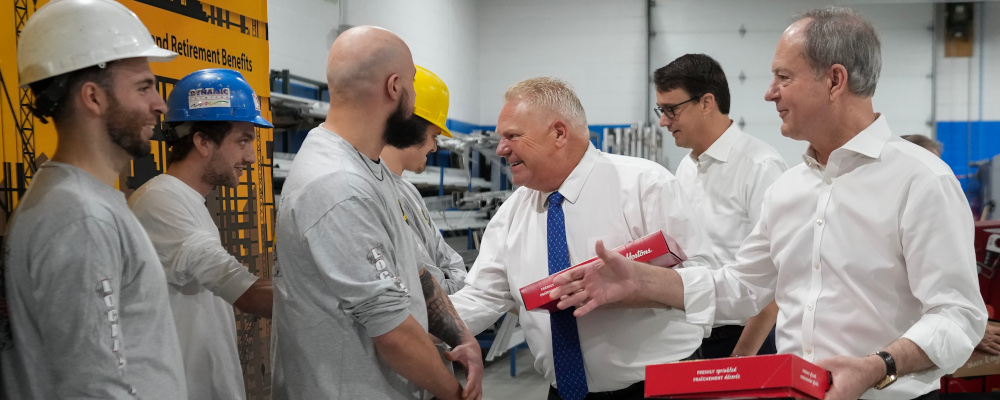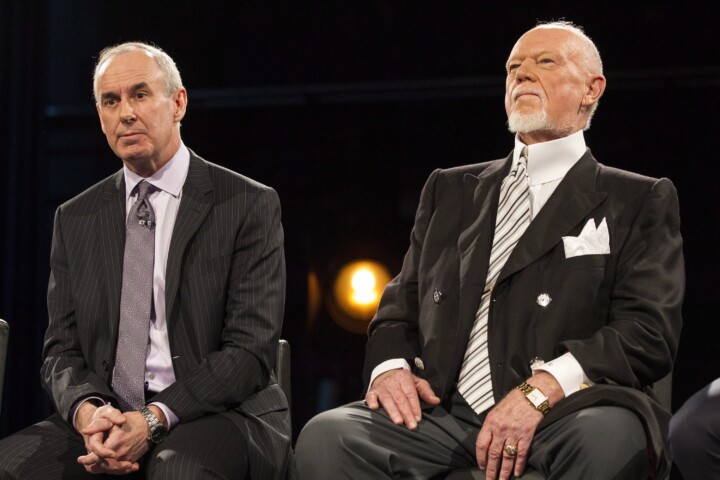The following is an excerpt from a speech by Monte McNaughton, Ontario’s minister of labour, immigration, training and skills development. It was delivered to the Empire Club of Canada in Toronto, Ontario on April 13, 2023. It has been edited and condensed for clarity.
Today I want to talk about the next chapter in our government’s Working for Workers plan and the road that brought us to this stage.
Almost four years ago, Premier Ford asked me to serve as his Minister of Labour. I really approached the role with the mindset of doing things differently—being pro-worker, working with private sector labour and employers, and bringing a new working-class, and blue-collar, conservatism to Canada. But, most importantly, with the mindset of identifying problems and fixing them as quickly as possible.
In the conversation we had at that time, and in our many conversations since, the Premier shared his belief—which is one that we share—that the issues of working people have not been given the same attention—from governments of all stripes—as those issues faced by business and academics.
I think part of the challenge is that the vast majority of people who live and work around government—civil servants, c-suite executives, academics, journalists, and, yes, politicians like me—live professional and personal lives surrounded by friends, neighbours, and colleagues who also come from the business and academic classes.
No matter where we came from, like it or not, the majority of us in this room are leading lives that shelter us from the reality facing many of the workers who keep our great province and country moving. Once you see it you can’t unsee it.
But that doesn’t make their issues less important. In fact, it means we need to work even harder to bring them into the light. Anybody who knows Premier Ford knows how hard he works to stay connected to working people. God knows he gives his mobile number out to thousands of people.
It’s part of why I work to stay grounded and remember where I’m from—working in a family hardware store in Newbury, Ontario—and the value of knowing how to get your hands dirty to get the job done. I should add that as Minister of Labour, I can’t actually say at what age my dad had me working in the store or loading building supplies. I think we had rules against that.
Now, in my nearly four years as Labour Minister in a conservative government, the biggest misconception I’ve noticed is the argument that Conservatives aren’t the party of blue-collar workers. And, look, there may have been some truth to that critique 30 or 40 years ago, but it sure isn’t true now, especially under the leadership of Premier Ford.
If it were true, I wouldn’t have announced a few weeks ago that Ontario’s minimum wage is set to increase by $1.05, and that we will be North America’s first jurisdiction to bring in Portable Benefits to millions of workers that don’t have health benefits today.
I believe that the future of conservatism is a working-class future.
The last election in Ontario proved that and it’s just the beginning if we push forward an agenda that involves a genuine and lasting shift of power to working people. Here is something I have learned over the course of the past five elections. Politics in Ontario, and Canada, and I’d argue the Western world, is rapidly changing.
Most of the downtown elite and corporate classes decamped to the Liberals a long time ago. And these days it’s likely fair to say that it’s probably a lot easier to bump into a liberal than bump into a conservative on Bay Street. A complete reversal of where things were a decade or two ago.
And the NDP, traditionally a party of workers, are in the midst of an identity crisis, tying themselves in knots trying to be woke instead of focusing on the real issues impacting workers—like jobs with pensions and benefits, so people can build stronger families.
This means there are a lot of people in this country. Good people. Hard-working people. Including private sector union members and their leaders who never saw themselves working with or supporting a PC government. Who, sometimes with good cause, never trusted conservatives and who maybe, just maybe, are now prepared to give us a fair shot—but only if we treat them with the respect they deserve.
And it’s a shot I don’t want to miss. Which is why my door has been open from day one. If you have a problem, let’s fix it. It sounds crazy, but this simple approach has been the key to our success.

I’ve heard from people who have problems most of us never think about. How many of you who are taking your time between work meetings to join us for this lunch and listen to me speak are concerned about whether the bathrooms at this event are clean, or safe, or if the doors in the stalls lock?
Let’s see all those hands…and that’s my point. If this was a room full of truck drivers or construction workers, a lot more hands would shoot up if I asked the same question about their workplaces.
The reason I am illustrating this point is that it’s important our government listen to the voices of people who haven’t been listened to for a long time, many who have been forgotten by politicians and governments of all stripes.
It is why, in our first Working for Workers legislation, we made it the law that truck drivers and app-based delivery drivers get to use washrooms along their routes. Common sense.
So while I hear about a lot of problems. My job—and our government’s job—is to find solutions. These problems can be solved by all of us working together: government, labour, and business. Under the leadership of Premier Ford, we passed bills full of Working for Workers measures in 2021 and 2022:
• Washrooms for truck drivers;
• banned non-compete clauses;
• brought in the right to disconnect;
• recognized international credentials for immigrants by eliminating the Canadian work experience requirement;
• hired more health and safety inspectors;
• brought in the right to privacy so employers couldn’t monitor employees;
• mandated naloxone kits in workplaces;
• and brought in foundational rights for gig workers like a minimum wage.
Our third bill is now making its way through the legislature and is filled with common sense, practical ways we can make life better, make sure there’s a path for people to get ahead, and give working families some breathing room. These changes are also important for employers, as we work to retain and attract workers, to fill labour shortages.
I know I covered a lot today, but you can’t truly work for workers unless you are also prepared to work hard. The measures I’ve outlined today are about putting a conservative, workers-first vision into practice. They’re the result of listening to workers and people from all walks of life. They build on our previous two bills and set the stage for more to come. They’re about focusing on real problems—problems ignored for too long—and creating solutions that make a real difference in people’s lives. They’re about leaving no one behind. If you can, and want, to work, we need you. There are endless opportunities. We need all hands on deck to meet these challenges, and working together we can build a stronger Ontario.
Thank you.
Recommended for You

Falice Chin: A tale of two (Poilievre) ridings

Evan Menzies: Calgary at 150: Why is it so hard to celebrate our history?

Howard Anglin: Canada is badly failing the ‘Tebbit Test’

‘We’re winning the battle of ideas’: Conservative MP Aaron Gunn on young men moving right, the fall of ‘wokeness,’ and the unraveling of Canadian identity



